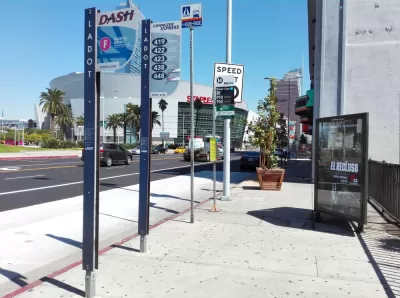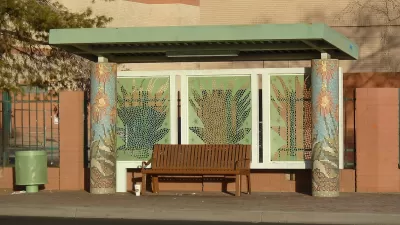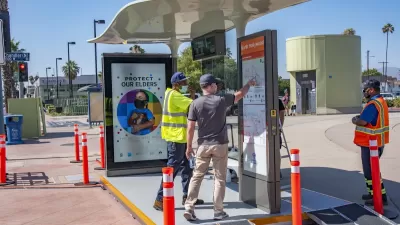Bus riders in Los Angeles frequently lack protection from sun and extreme heat, with bus stops in some of the county’s hottest areas having the worst amenities.

If you’ve taken a bus in Los Angeles, chances are you’ve noticed a few desolate bus stops that lack shelters, seating, or nearby trees to offer protection from extreme heat, rain, or wind. Dan Zukowski describes the situation in Smart Cities Dive, referencing a new study from the University of California, Los Angeles, Lewis Center for Regional Policy Studies that reveals that only 26 percent of Los Angeles County bus stops have shelters.
The problem isn’t unique to the City of Angels: “According to data compiled by the Washington Post last year, less than 20% of more than 122,000 bus stops in use by 16 large U.S. transit agencies have bus shelters.”
As Zukowski explains, “Typically, local jurisdictions, not transit agencies, are responsible for installing and maintaining bus shelters, according to the report. That means that some cities will have substantially higher numbers of shelters while others will have relatively few.” The Lewis Center study noted that in Los Angeles County, “neighborhoods with high Latino populations average temperatures that are four degrees warmer than those with low Latino populations and that ‘extreme heat days are warmer in neighborhoods with more Black residents than those with fewer Black residents.’”
As extreme heat becomes more common, the study’s authors write, “government partners will need to prioritize where new shelters are installed and consider how to maximize their benefits.”
FULL STORY: Most Los Angeles County bus stops lack protection from extreme heat

Planetizen Federal Action Tracker
A weekly monitor of how Trump’s orders and actions are impacting planners and planning in America.

Chicago’s Ghost Rails
Just beneath the surface of the modern city lie the remnants of its expansive early 20th-century streetcar system.

San Antonio and Austin are Fusing Into one Massive Megaregion
The region spanning the two central Texas cities is growing fast, posing challenges for local infrastructure and water supplies.

Since Zion's Shuttles Went Electric “The Smog is Gone”
Visitors to Zion National Park can enjoy the canyon via the nation’s first fully electric park shuttle system.

Trump Distributing DOT Safety Funds at 1/10 Rate of Biden
Funds for Safe Streets and other transportation safety and equity programs are being held up by administrative reviews and conflicts with the Trump administration’s priorities.

German Cities Subsidize Taxis for Women Amid Wave of Violence
Free or low-cost taxi rides can help women navigate cities more safely, but critics say the programs don't address the root causes of violence against women.
Urban Design for Planners 1: Software Tools
This six-course series explores essential urban design concepts using open source software and equips planners with the tools they need to participate fully in the urban design process.
Planning for Universal Design
Learn the tools for implementing Universal Design in planning regulations.
planning NEXT
Appalachian Highlands Housing Partners
Mpact (founded as Rail~Volution)
City of Camden Redevelopment Agency
City of Astoria
City of Portland
City of Laramie





























